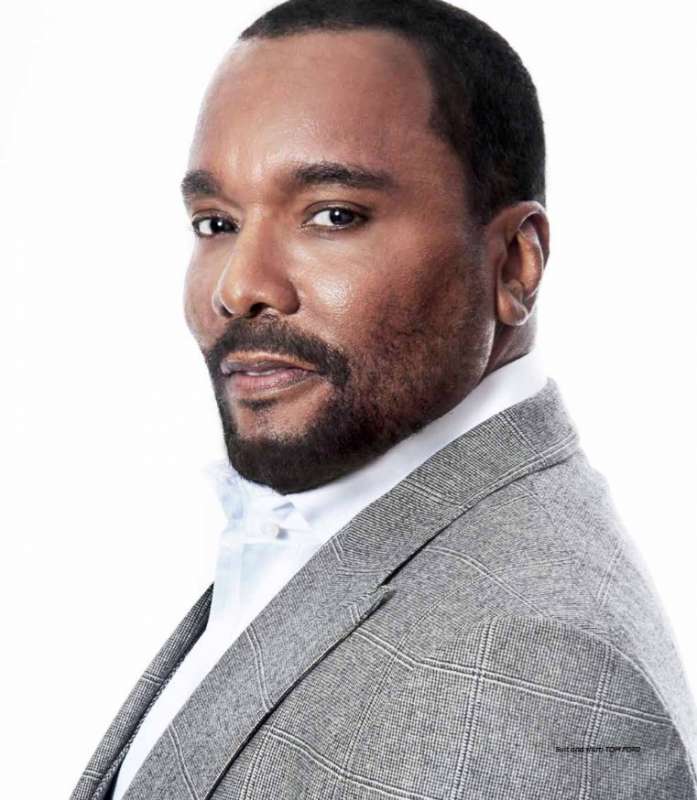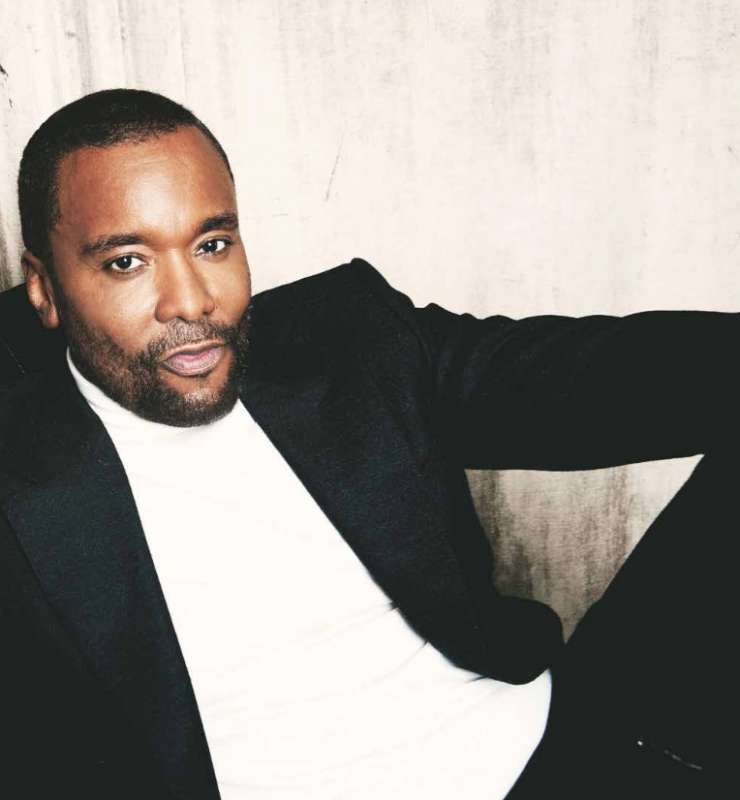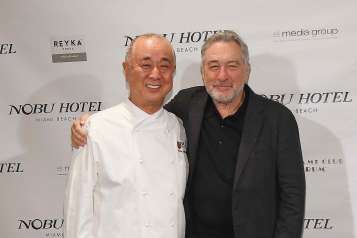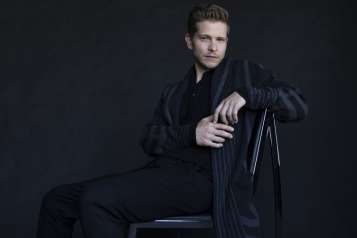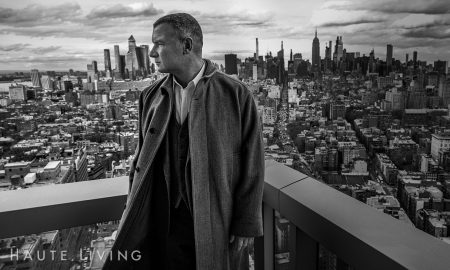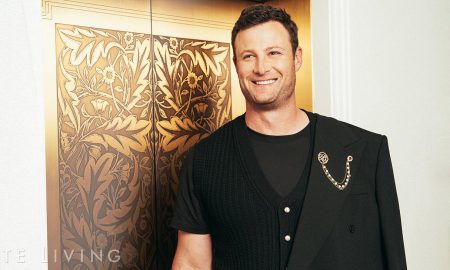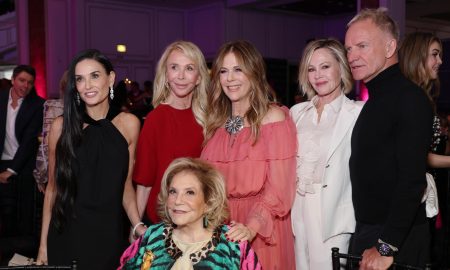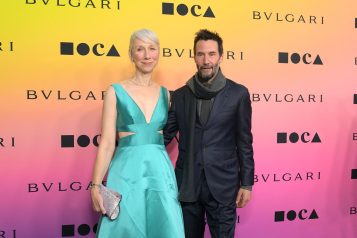PHOTOGRAPHY: ANDREAS BRANCH • CREATIVE DIRECTION: KELCEY NEWMAN • STYLING: MIRIAM STERNOFF AND MICAELA BECKWITH • GROOMING: HEE SOO KWON
Shot on location at the SLS Beverly Hills
Within five minutes of meeting Lee Daniels, you realize that the guy is a giver. Yes, we do mean in the philanthropic sense, but his generosity is more than mere largesse. When he gives anything—be it his time, attention or advice—he gives it fully. He is completely present, wholly engaged and always, without a doubt, one hundred percent himself. That said, Lee Daniels will also—if the situation calls for it—give you hell.
He refers to himself as “intuitive and kind to a fault” but also, when he’s hurt, “ruthless to get back on track.” He also realizes that his self-descriptions clash, but that’s pure Lee Daniels for you.
“That’s completely contradictory, right?” he says with a laugh, before going into further detail. “I don’t like insulting anybody. I am kind to a fault, even if it means hurting myself. But when I find my art compromised, I’m ruthless, because when I feel like I’m being taken advantage of, or that people take my kindness as weakness, I become the guy from the streets [where I grew up], which has gotten me where I’m at today.”
Let’s recap Lee’s successes: he is a two-time Academy Award-winning director who also produced Monster’s Ball, a film that made history for making its star, Halle Berry, the first African-American to win a Best Actress Oscar. He later became the cocreator, executive producer, writer and a director of Empire, one of the hottest shows on television. Even more impressively, Daniels reached Hollywood all on the strength of sheer will.
Seriously, his story could have been scripted. He grew up in Philadelphia before moving to St. Charles, Missouri, to attend college at Lindenwood University. Then, when he couldn’t afford film school after graduating, Daniels moved to California and began working as a receptionist in a nursing agency. If you’re a fan of the musical Annie Get Your Gun, you’ll remember the lyrics, “Anything you can do, I can do better / I can do anything better than you.” Well, that’s Lee Daniels to a T. He soon realized he could start his own agency and, by the tender age of 21, had a company with over 5,000 affiliated nurses. He then segued from nurses to actors and became both a casting director and manager. Monster’s Ball was, unbelievably, his first production effort and the rest, as they say, is history.
Daniels would agree that he’s living the dream—he’s matter-of-fact about his success and doesn’t pussyfoot with humble platitudes—but, because of it, he also feels a strong sense of purpose to create similar opportunities for those who remind him of who he used to be: a kid with hustle from the streets of Philadelphia.
Then again, it seemed almost predestined that he would work with Ghetto Film School (GFS), an award-winning nonprofit known for its unique approach to film-making. The organization plucks up-and-coming filmmakers from diverse backgrounds and gives them the tools to accomplish their goals through a pre-professional narrative filmmaking program, as well as an early career support network for those already working in creative industries.
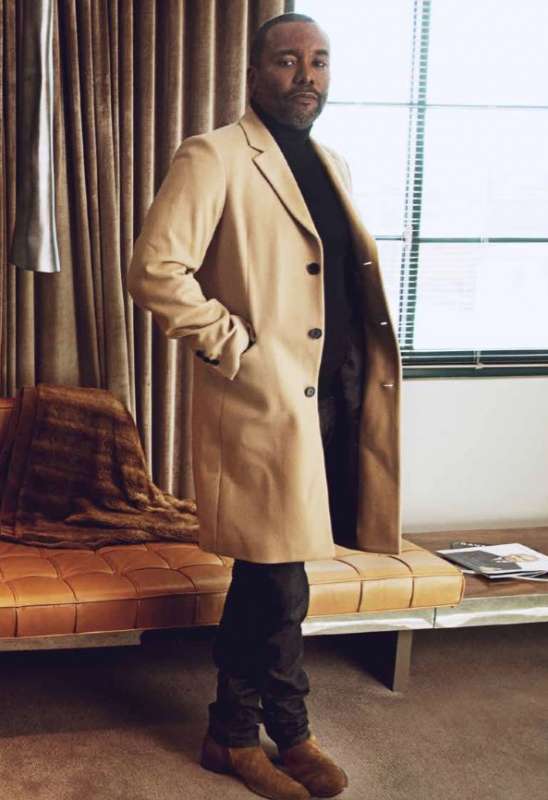
Boots: SAINT LAURENT
He originally stumbled upon GFS by accident in 2001. While looking for interns, founder Joe Hall told him he could help. “We just started kicking it and he started introducing me to these kids and I felt this overwhelming need to participate, to help, to be a part of it.” For Daniels, the decision to become involved was highly personal. “These kids reminded me of myself,” he notes. “They [were visionary creatives whose work might otherwise go unnoticed] and they wanted to do cinema.”
Call it what you like: fate, destiny or even God’s will. Lee does. “I kept thinking for the longest time that this gift is not mine. It belongs to God; it belongs to the universe. Whatever gifts I have, they won’t last if I don’t pass them on. I don’t know what it is exactly; I don’t know if it’s karmic, but it’s something that is spiritual in me that I understand. It is my obligation to pass it on to people that are far more talented than I am, that have the possibilities to do what it is that I have yet to achieve.”
Daniels isn’t all talk and no action where his students are concerned: he’s a hands-on mentor who puts his money where his mouth is. Not only does he lend his expertise by teaching classes on both coasts, but the Lee Daniels Entertainment company he established was the first ever to host interns and hire alumni as employees back in 2003, and continues to do so to this day.
He fondly recalls his early days working with the organization when he was an up-and-coming filmmaker himself. “I had an office in Harlem, a brownstone where I lived, and I would have 20 kids over. [I’d say] ‘Okay, have you read the scripts? Give me something good! What is my next movie?’ Then, we would dissect scripts and we would understand characters.”
He wouldn’t call what he did with Ghetto Film School in its infancy ‘work.’ Instead, he says, “It was family to me. A lot of them were gay and were coming out [Daniels himself is openly gay] and were going through the same struggles that I was going through. Giving back, really, was part of my evolution as a filmmaker.”
He will always be loyal to the nonprofit because of the kindness Joe Hall showed him. Although he has less time to teach now, Daniels says he enjoyed it so much because, prior to starting his career, “there [had been] no one there for me. I had to learn firsthand on a set.” He adds, “[Teaching] was the same high I got from filmmaking.”
Now, with so many projects on his plate, from Empire to his hotly anticipated new series, Star, to a Richard Pryor biopic starring Omar Epps and Oprah Winfrey (who also starred in his 2013 film, The Butler), his role within the organization has changed, but he still remains active in a different capacity: on the GFS Board of Directors, along with 21st Century Fox CEO James Murdoch and close pal and fellow filmmaker David O. Russell.
“I’m no longer an independent filmmaker struggling very hard from film to film. Now I’m sort of a different animal… a beast—that’s the word!” he declares with his notoriously infectious laugh.
Nowadays, Daniels’ lessons—to his students and to his own two children—remain the same, and happen to be the same lessons he himself learned through almost 57 years of trial and error. “I try to teach kids [that] you have to have a vision. You have to have what it is that you want to paint—the portrait, the theme and the story that you want to tell. You have to know that you don’t have the answers, that this has to be a collaboration. You must surround yourself with people that know more than you in their craft because that’s when true genius happens. That genius comes through the humility of knowing that you don’t know it all, and that you have to rely on people.”
This, he applies to his own life and the people that have surrounded him on multiple film sets and, in particular, on Empire. “I’ve seen directors take credit for things they shouldn’t be taking credit for. I can’t take credit [for my students’] fire. Yes, it is my story. Yes, I directed it, but I had a partner [Danny Strong] that helped facilitate that. I have another showrunner who ran with my ideas. I have incredible writers. I have FOX, who I fight with often about my vision, but sadly—and they would love to hear me say this—they are right about a lot of things. They saved me from myself a lot of times.”
To forget those that work with you, that better you, is career suicide, in Daniels’ opinion. “Ego is death,” he notes. “You have to have a healthy ego, but you also have to give credit where credit is due—and that’s what I try to tell my kids.”
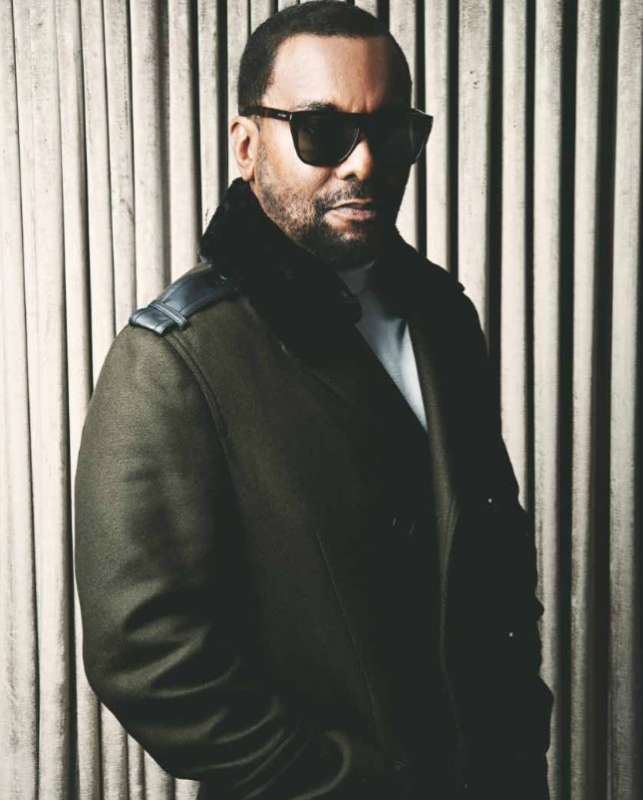
STAR POWER + TRUSTING HIS INTUITION
It’s Friday afternoon and Lee Daniels is in a jovial mood. He’s on Santa Monica Boulevard in Los Angeles, furniture shopping for his Manhattan loft. He will soon be jetting to Atlanta, where he’ll begin production on his latest show, Star. But first: retail therapy. “Let me tell you something. I am about to upset my business manager because I am going shopping, and I am in front of a store where I’m about to do some damage!” he says with a laugh, but also with such conviction that we can almost hear his business manager sigh in despair.
But why shouldn’t he treat himself? He’s a notoriously hard worker, and has achieved a ridiculous amount of fame and fortune over the past 15 years. However, he also hasn’t achieved this level of success by being a dummy. Sure, he can turn on that mega-watt grin and easy charm for anyone—we were slammed with the full force of it during our photo shoot at the SLS hotel and are still a little dazed—but you should also know you’ll have to jump through hoops to gain his trust. Once bitten, twice shy, as they say. “Getting my trust is a motherfucker because you really have to prove to me that you know your shit, because I know I know my shit,” he declares, before adding, “But once I trust you, then everything is ‘Kool & the Gang’—then we run wild.”
Again, he’s going to be honest: Daniels knows almost immediately if he’s going to grant that trust. He might not tell you right away but, then, he’s a businessman. He’s strategic. “I’m very intuitive,” he notes. “I know immediately whether somebody is a good egg or a bad egg.”
That intuition has helped him not only in his career, but in life as a whole. “I think it has kept me from being shot and from catching HIV. My intuition is ultimately my greatest gift, and I [choose whether or not to] trust pretty quickly because I see the light or the dark coming in.”
He hasn’t always listened to that intuition, but that’s an entirely different matter. “I’ve been wrong,” he admits. “And I’ve been wrong and wrong and wrong. I have not listened to my spirit.”
Such was the case with Star, a musical drama set in Atlanta that revolves around three young singers navigating the often-bumpy road to success in the music business. The series hit a snag in September when its former show runner, Charles Murray, left; he has since been replaced by Charles Pratt Jr.
Daniels doesn’t shy away from the topic: instead, he frankly admits that he should have gone with his gut. “I met with someone that, instinctively, I felt didn’t have the vision. I was told, ‘Well, there is nobody else out there and we’re not going to make our deadlines.’ So I said, ‘He’s terrific and I love him and he’s very, very talented, but [I should have added] I don’t know that he has the right voice.’
“That’s why so many artists fail—they don’t listen to their spirit, and I’ve never not listened to my spirit. When I [don’t], it leads me astray; it’s bad.”
That said, Star’s production is now coming along swimmingly. No harm, no foul. Daniels is currently filming the show in Atlanta with stars Queen Latifah and Benjamin Bratt, as well as newcomers Jude Demorest, Ryan Destiny and Brittany O’Grady. Thanks to original music and musical fantasy sequences, the series is projected to be as big of a hit as Daniels’ other television sensation, Empire—and he owes it all to Denzel Washington.
While “kicking it” with the Oscar winner one day after FOX requested another project, Washington asked Daniels a poignant, pointed question. “He asked me: ’What got you into the business in the first place?’ and I was like, ‘I remember being 16 and stealing my mother’s Eldorado and driving from Philadelphia to New York to see the Broadway production of Dream Girls, how it changed my life and how it made me want to do what it is that I do.”
He also knew that the show had to be the ‘anti-Empire.’ But he thinks it will still resonate with viewers because “we see a lot of ourselves in them. We love them, we feel their pain. It’s a much darker show than Empire,” he says of the series, which is based on Jacqueline Susann’s iconic 1960s novel, Valley of the Dolls. Daniels adds, “Where Empire is poppier and really about success, this is about talent and the underbelly of the music industry in a way that we haven’t seen before, all through music.”
He continues, “We slowly but surely see [this girl group] tear themselves down as they become sort of successful. How do they accept fame and the price that they have to pay for it? Through it, we do go into world political issues that are hitting home today: The Black Lives Matter issue, the atrocities that happen in foster care homes. We see our lead, Star, who is white, thrown into a black world, and we see what it’s like to be white in a black world. We see racism in a way that we haven’t seen it before. Everybody is too afraid to say that black people can be racists too, and so we never see what the other side is like. I’m real excited about showing that other side.”
While it seems that his own ‘star’ is prepared to rise, Daniels refuses to count his chickens before they’ve hatched, as much as he’d like to—and as much as the series seems groomed for it, given that it’s taking Empire’s hot spot of Wednesdays at 9 pm when the former goes on hiatus. “I’m always prepared for failure,” he admits. “I learned early on not to expect success. I’m still very wary and very skeptical and still prepared for failure so that I don’t get my hopes up too high.”
He issued the same warning to his three ingénues, as well. “I said, ‘Listen: they’re coming for us. With success, they’ve got to build you up and tear you down. That’s part of Hollywood—don’t take it personal.’”
That doesn’t mean he isn’t championing the show’s success anyway—or the success of its stars. “These girls are just breathtaking. They’re provocative, and they’re today’s girls with today’s women’s point of views. It’s very exciting to see,” he notes, before comparing these ladies to another set of famous females. “I remember how Sex and the City hit when it first came out and I thought, ‘Whoa… these girls have a point of view.’ [Star] has a little bit of that, but with me all over it.”
BUILDING AN EMPIRE
What’s the easiest way to get mega-star Mariah Carey on Empire? That would be to not offer Mariah Carey a role on Empire.
“She stopped calling me,” Daniels says of the five-time Grammy winner, who also starred in his 2009 drama, Precious. “She’s one of my very best friends and someone I speak to regularly, but she stopped calling me. I hadn’t heard from her in like a month, which was weird. You get busy and stuff, but not that busy. So I called her and I was like, ‘What’s up? Where are you?’ and she goes, ‘You’ve had everyone on Empire but me.’ And I was like, ‘Uh oh! Let me put you on. Okay? Don’t worry about it.’”
And there you have it. Carey made her grand appearance on the series’ third season this year as Kitty, a character who serves as the catalyst for Jamal Lyon’s [Jussie Smollett] temporary return. Her character’s name, as it happens, is an inside joke between the two longtime pals. “She calls me Cotton and I call her Kitten. Our names are based on an early John Waters movie that we both love. That’s why her name on the show is Kitty.”
Fans might even get to see that ‘empire’ expand, as Daniels can confirm that a spin-off is being discussed—and that, should it happen, it will revolve around Lucious Lyon [Terrence Howard], the show’s protagonist, antihero and the founder of Empire Entertainment, and his ex-wife and fellow CEO Cookie [Taraji P. Henson] during their younger years.
“We ended up casting a young Lucious and a young Cookie, and they were so incredible,” Daniels explains. “My sister [Leah Daniels] is a casting director, and she discovered both of them. I didn’t really want to do an Empire spin-off at all, but they were so good that, when [the studio] talked about it, I said, ‘Okay, I’ll think about it.’ There are only talks at the moment.”
That said, he wouldn’t be Lee Daniels if he didn’t already have a story in mind. He’s always plotting, thinking, creating. In addition to his two shows, he’s working on two projects with Empire executive producer Brian Grazer. The first is a single-camera half-hour comedy series starring standup comedian Ms. Pat. The second is a remake of the 1983 Best Picture Academy Award winning-film Terms of Endearment. For those unfamiliar with James L. Brooks’ tearjerker, Emma, played by Debra Winger, splits from her philandering husband, Flap (Jeff Daniels), and returns home to live with her mother, Aurora (Shirley MacLaine), before discovering that she has terminal cancer.
Daniels can’t reveal much about the movie, other than the fact that it’s not what anyone will expect—the story has been flipped and will be “a black version set in the ‘90s.” In his depiction, Flap contracts HIV, which he passes on to his wife unknowingly. “I tell stories that I know, and so many of my friends passed away from AIDS,” Daniels says. “[In my film,] instead of dying of cancer, Emma dies of AIDS. Aurora has to come to terms with forgiving him because he killed her daughter.”
Heavy stuff, but Daniels isn’t one to shy away from controversial topics. “Everybody that I’ve ever written, that I’ve ever directed, is based on a situation of either myself, or a family member, or a best friend,” he confides. It’s a true skill to tell stories the way Lee does, taking real-life, personal events and spinning them into palatable bites of celluloid fodder, keeping viewers not only constantly engaged, but on the edge of their seats to see what’s next.
This love of storytelling is the legacy he wants to pass on through Ghetto Film School and, one day, through his own education center. “In my next life—no, in this life—I probably will open a film school myself,” he says. “I might teach; not at a university or anything, but for people who come from where I’m from. There’s no greater high than passing it on, for me, other than creating art.”
He pauses for nearly a beat before adding with his signature laugh, “You can quote me, honey. You can quote and quote and quote.” Consider it done.
